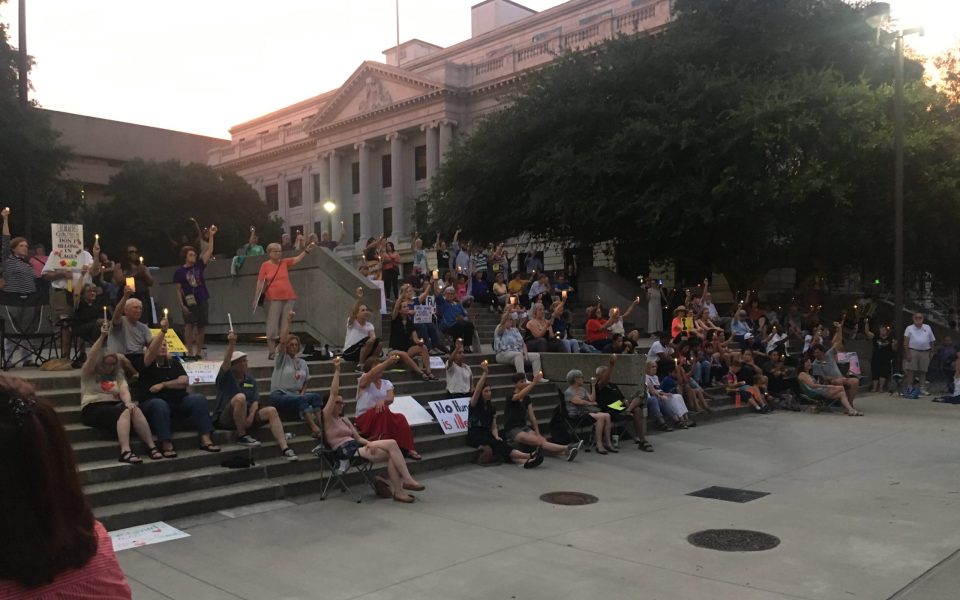About 500 protesters gathered to express dismay about the treatment of immigrants at Greensboro’s Government Plaza on Friday evening, part of a coordinated nationwide response to conditions in detention camps where children are being held at the US-Mexico border.
“I’ve been to Stewart Detention Center and I’ll never forget the face of a young man I met and talked with there. I asked him what he wanted me to tell people back home, he was from North Carolina and was detained— torn away from his wife and two young children,” the Rev. Julie Peoples of Greensboro’s Congregational United Church to the crowd, describing her visit to the detention facility in Georgia. “He looked over his shoulder to make sure no one was listening to him.
“‘The water,’ he whispered to me. ‘The water here is black and people are getting sick. Tell them about the water.’”
More than 900 cities across the United States held vigils for the children held in immigrant detention camps on Friday night. Migrant children, separated from their parents, live in overcrowded and unsanitary conditions, according to multiple reports.
Speakers in Greensboro, many of them refugees and immigrants, highlighted treatment of the children at the border, by telling their own stories.
“I was taken to a refugee camp, living in a tent for many years,” said Prince Mundeke, a local faith leader who left his family at 17 and fled the Democratic Republic of the Congo during the wars of the late 1990s and early 2000s. “I spent days without eating. Not because I was fasting, but because there was no food or water to drink. Life in the camp was not easy. In brief, I spent 12 years in refugee life.” After a lengthy, bureaucratic process, Mundeke came to the United States. “But I didn’t know where I was going,” he said. “You don’t choose where to go.”
Anna Luisa Daigneault, a musician and singer who performs under the name Quilla, took an intentional approach to making sure the gathering reflected Greensboro’s diversity when she organized the local event.
“I conducted two community meetings that ended up with people from 15 different organizations and they [nominated] speakers,” Daigneault said. “Both were attended by many people, and that’s where we worked out speaker list, artists list and logistics.”
While Daigneault said detentions carried out by Immigration and Customs Enforcement across the state motivated her to organize the local event, she also had more personal reasons.
“I’m Latina, I have a two-year-old daughter,” she said in an interview after the rally. “I cannot fathom what it’d be like to be separated from her…. I’m completely enraged by that thought. Leading up to the decision to have this event, I was having nightmares for weeks. I could barely watch the news… [I’d see myself] when I would [look at] the faces behind the fences of those cages. I’d see my relatives.”
Rabbi Fred Guttman of Temple Emanuel in Greensboro said it’s important for people who oppose the way children are being treated at the border to continue to speak out.
“We know that it’s much easier to tear things apart than to stitch them together,” he said. “But we will keep showing up, no matter how long it takes. And why? Because we are parents and grandparents ourselves. Because we are brothers and sisters. Because we are witnesses and because we are weavers…. We are threads in the tapestry of God’s creation. And tonight, we commit ourselves to stitch together that which has been torn apart.”
The estimated size of the crowd was revised from “hundreds” to “about 500” in response to readers’ concerns that it was too broad.
Join the First Amendment Society, a membership that goes directly to funding TCB‘s newsroom.
We believe that reporting can save the world.
The TCB First Amendment Society recognizes the vital role of a free, unfettered press with a bundling of local experiences designed to build community, and unique engagements with our newsroom that will help you understand, and shape, local journalism’s critical role in uplifting the people in our cities.
All revenue goes directly into the newsroom as reporters’ salaries and freelance commissions.


Leave a Reply